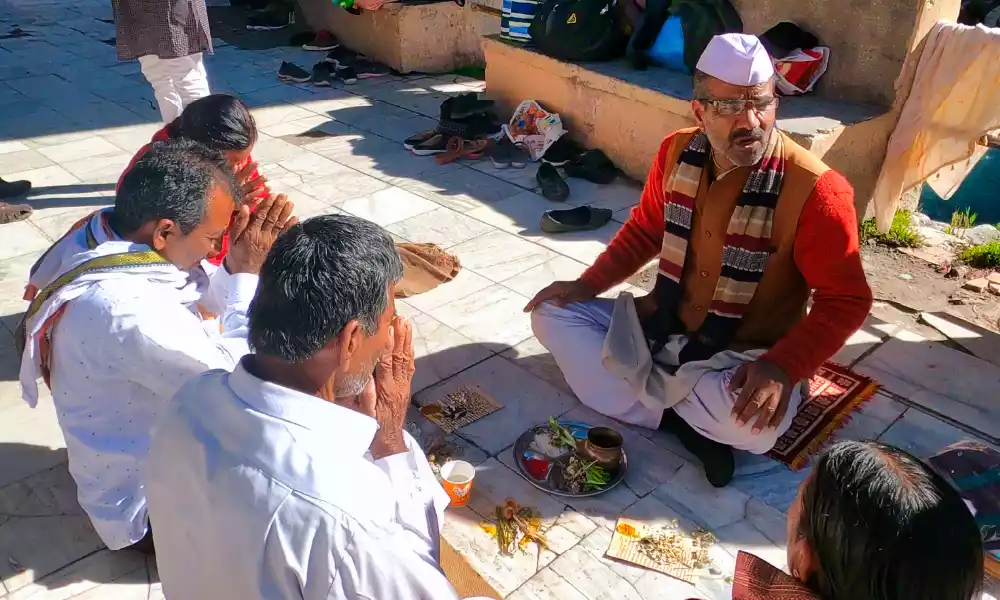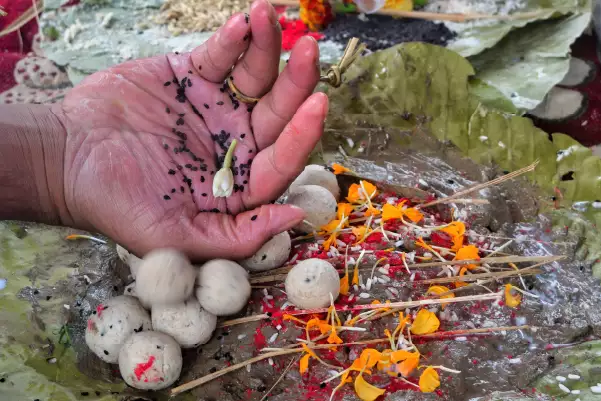Introduction
In this article, we delve into the profound significance of Pitrupaksha, also known as the Pitri Paksha or the fortnight of ancestors, in Hindu traditions. Pitru Paksha is a period of deep reverence and remembrance of our ancestors, and it holds a crucial place in Hindu rituals and beliefs.

This sacred occasion falls during the Bhadrapada month of the Hindu calendar, specifically in the Krishna Paksha (waning phase of the moon). Let us explore the customs, rituals, and spiritual importance of this unique observance.
Understanding the Essence of Pitru Paksha
Pitru Paksha is an age-old observance in Hindu culture, lasting for sixteen days. The word “Pitru” refers to ancestors, and “Paksha” means a fortnight. This period is dedicated to honouring and paying respects to our departed ancestors, offering them gratitude and seeking their blessings.

Hindus believe that during this time, the spirits of deceased ancestors visit the earthly realm, and by performing specific rituals and offerings, we can elevate their souls and seek their blessings.
The Significance of Tarpan and Shraddha
During Pitru Paksha, two crucial rituals are performed – Tarpan and Shraddha. Tarpan involves offering water and sesame seeds to the departed souls to quench their thirst and provide nourishment to their ethereal forms. The Shraddha ceremony is an elaborate affair, where prayers, hymns, and offerings are made to the ancestors. It is believed that by performing these rituals with sincerity and devotion, the souls of ancestors attain peace and liberation.
Importance of Ancestral Blessings
In Hinduism, the concept of lineage and ancestral blessings holds immense importance. It is believed that the blessings of ancestors have the power to positively influence one’s life.

By showing gratitude and respect to our forefathers during Pitru Paksha, we seek their guidance and blessings for a prosperous and harmonious life ahead.
Karma and Moksha – The Connection
The concept of karma and its impact on one’s life is deeply ingrained in Hindu philosophy. According to the law of karma, the actions we perform in this life shape our future experiences. By remembering and honouring our ancestors during Pitru Paksha, we acknowledge the debt of gratitude we owe to them for the life we have received. This recognition leads to spiritual growth and helps in the pursuit of moksha (liberation) from the cycle of birth and death.
The Ancestral Bond – Strengthening Family Ties
Pitru Paksha is not only about religious rituals; it is also a time to strengthen family bonds and foster a sense of unity among family members. Families come together to perform the ceremonies, sharing memories of departed loved ones and supporting each other in their grief. This sense of togetherness strengthens the fabric of the family and reinforces the values of love, compassion, and unity.
How to Observe Pitru Paksha
Observing Pitru Paksha requires adherence to specific customs and rituals. Families traditionally prepare food offerings and place them on banana leaves to invoke the presence of ancestors.

The food is then offered to crows, as they are considered messengers of the dead. Additionally, donations are made to the poor and needy, as it is believed to bring blessings from the ancestors.
The Connection with the Lunar Cycle
Pitru Paksha coincides with the waning phase of the moon, specifically during the Mahalaya Amavasya, which marks the beginning of this fortnight. The lunar cycle plays a crucial role in Hindu traditions, and this specific time is considered especially auspicious for connecting with ancestors.
The Spiritual Merit of Pitru Paksha
The spiritual significance of Pitru Paksha extends beyond seeking blessings for personal prosperity. It is also an opportunity to offer prayers for the welfare of all departed souls, regardless of one’s familial ties. Hindus believe in the concept of vasudhaiva kutumbakam, meaning the world is one family. Therefore, during this period, people offer their prayers for the souls who may have no one to remember them, thus earning spiritual merit.
Significance in Different Regions
While Pitru Paksha is observed throughout India, there may be variations in customs and rituals based on regional beliefs and practices.

In some regions, the fortnight is marked with elaborate rituals and ceremonies, while in others, it may be a more subdued affair. Nevertheless, the underlying essence of paying homage to ancestors remains constant across all regions.
Conclusion
Pitru Paksha holds a significant place in Hindu traditions, emphasizing the importance of gratitude, remembrance, and spiritual growth. By performing the Tarpan and Shraddha rituals and seeking the blessings of our ancestors, we not only honour our lineage but also strengthen the familial bonds that form the foundation of our society. Pitru Paksha reminds us of the eternal cycle of life and death and encourages us to lead a life of virtue, compassion, and righteousness.
As we observe this sacred fortnight, let us take a moment to remember all those who came before us, paving the path for our existence. May their blessings guide us on our journey towards enlightenment and liberation.

